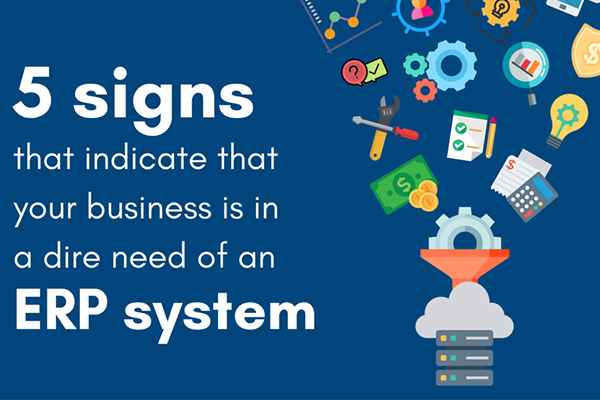Many ERP implementations fail because of the lack of prior planning and suitability-test for the business they are being implemented for. This often results in the misconception that while ERPs, in practice, cannot be put to optimum utilization. The fact is quite the contrary.
As a business grows, in order to keep up with the momentum, owners and managers need automation tools through which they can monitor and optimize day-to-day operations. It’s often difficult for a growing business to determine the need and requirements of an ERP. Here we list out the major signs that indicate the need of an ERP solution for your business.
1. When your existing workflows are unable to handle your business growth
The most vital and defining activity for a growing business is how it streamlines operations and defines workflows. The workflows that seemed perfect previously may not work or worse, may end up harming the operations. Therefore, if you observe your internal workflows are not working as they are supposed to, then it’s time for your business establishment to invest in a robust ERP solution .
2. When you realize that you are spending too many resources in oversight and monitoring
Automation is the key towards maintaining consistency in the speed of business growth. If you are spending more time in overseeing your managers and your managers are spending more time in monitoring the employees then your workforce won’t have time to come-up with and implement new ideas.
An ERP system will set up workflows and reporting structures based on your organization’s hierarchies, and the time you spend in oversight will be significantly decreased.

3. When there is a drop in the quality of your customer service
As you attract more customers, you will end up realizing the bitter truth that you can’t keep all the people happy, all the time. If you notice that there is a significant drop in the quality of your customer service, with more and more tickets being raised and remaining unresolved, then it’s time to invest in a system that will help you keep track of all the tickets raised and prioritize them based on their importance.
ERP solutions have powerful in-built CRM solutions that will help you maintain a highly responsive customer care service with minimum man-power and resources. Many ERPs also have the capability of integrating any existing or third-party CRM solution into their fold, eliminating the need of re-feeding the data in a new CRM.
4. When the lack of inter-departmental integration starts costing you resources
For an organization with multiple departments, it’s essential that they are fully integrated to ensure secure and speedy transfer of information. If you start noticing that the departments in your business are getting slow in internal communication due to lack of integration then you should start zeroing down on a suitable ERP system to help integrate them in a single platform.
Lack of integration not only affects internal communication but also results in dissatisfaction among customers as their orders for products/services start to get stonewalled. By integrating all aspects of your business, ERP systems can help you overcome this challenge while avoiding problems such as data duplication. They can also help you in integrating sales data from different branches of your business.
5. When you are unable to access insights to take timely data-driven decisions
Data and insights serve as the backbone for decision making. In today’s technology-driven era, business owners are taking decisions based on predictive analysis which help them determine the future behavior of their customers. It will be indeed very unfortunate if you, as a business owner don’t have access to the data about the past or existing trends and buying habits of your customers. Decisions taken without such insights are bound to fail or won’t help your business in the long run.
Powered by proficient (BI) Business Intelligence tools, ERP systems have reporting capabilities that will help you gauge and analyze every aspect of your business. The customizable reports will not only give you access to accurate insights but will also not eat-up into resources such as time and man-power which may prove a problem in taking timely decisions or affect the accuracy of the reports.
With different tax laws being implemented across various countries, the need of ERP solutions has further intensified. Businesses that opted for these solutions are already experiencing exponential growth both in revenue and operations. If you are willing to join them, you can start by opting for a free consultation to help understand which ERP solution will suit your business.








